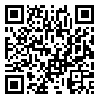Volume 5, Issue 4 (December 2018)
Health Spiritual Med Ethics 2018, 5(4): 15-21 |
Back to browse issues page
Download citation:
BibTeX | RIS | EndNote | Medlars | ProCite | Reference Manager | RefWorks
Send citation to:



BibTeX | RIS | EndNote | Medlars | ProCite | Reference Manager | RefWorks
Send citation to:
Doodman P, Mohammad Jani F, Hashemi S A, Mashinchi A A. Examining Spiritual Intelligence and Learning Style of High School Students in Lamerd. Health Spiritual Med Ethics 2018; 5 (4) :15-21
URL: http://jhsme.muq.ac.ir/article-1-175-en.html
URL: http://jhsme.muq.ac.ir/article-1-175-en.html
1- Faculty of Economics and Social Sciences, Payame Noor University, Tehran, Iran , fdoodman@gmail.com
2- Faculty of Economics and Social Sciences, Payame Noor University, Tehran, Iran
3- Department of Education Lamerd Branch, Islamic Azad University, Lamerd, Iran
2- Faculty of Economics and Social Sciences, Payame Noor University, Tehran, Iran
3- Department of Education Lamerd Branch, Islamic Azad University, Lamerd, Iran
Abstract: (4180 Views)
Background and Objectives: The construct of spiritual intelligence (henceforth SI) encompasses some kind of adaptation and problem-solving behavior. SI also includes the highest levels of development in diverse cognitive, ethical, emotional, and interpersonal domains. The purpose of this study is thus to examine SI and learning style of high school students in Lamerd, Fars, Iran.
Methods: The study employed descriptive methods. The population of the study comprised all high school students who were studying mathematics, physics, experimental sciences and humanities in 2016 and 2017. Using multistage cluster sampling method, the sample was composed of 300 high school students. Data were obtained using King’s Spiritual Intelligence Questionnaire and Kolb's Cognitive Style Questionnaire. Descriptive statistics (e.g., Mean and Standard Deviation) and inferential statistics (e.g., correlation coefficient, multiple regression and independent t test) were used to analyze the data.
Results: The results showed that the level of spiritual intelligence in converging, diverging, assimilating, and accommodating learning styles was 0.86, 0.57, 0.64 and 0.74, respectively. In addition, there existed no significant relationship between SI and learning style (p=0.154). The results of the study further indicated that, in terms of SI, there was not a significant difference between boys and girls, and that abstract conceptualization and active experimentation can significantly predict SI. Moreover, the results showed that there existed a relationship between learning style and field of study (p<0.001).
Conclusion: The present study indicated that abstract conceptualization and active experimentation can significantly predict SI. Overall, abstract conceptualization and active experimentation can potentially help in using practical ideas and theories. Hence, strengthening SI can greatly facilitate the learning processes.
Methods: The study employed descriptive methods. The population of the study comprised all high school students who were studying mathematics, physics, experimental sciences and humanities in 2016 and 2017. Using multistage cluster sampling method, the sample was composed of 300 high school students. Data were obtained using King’s Spiritual Intelligence Questionnaire and Kolb's Cognitive Style Questionnaire. Descriptive statistics (e.g., Mean and Standard Deviation) and inferential statistics (e.g., correlation coefficient, multiple regression and independent t test) were used to analyze the data.
Results: The results showed that the level of spiritual intelligence in converging, diverging, assimilating, and accommodating learning styles was 0.86, 0.57, 0.64 and 0.74, respectively. In addition, there existed no significant relationship between SI and learning style (p=0.154). The results of the study further indicated that, in terms of SI, there was not a significant difference between boys and girls, and that abstract conceptualization and active experimentation can significantly predict SI. Moreover, the results showed that there existed a relationship between learning style and field of study (p<0.001).
Conclusion: The present study indicated that abstract conceptualization and active experimentation can significantly predict SI. Overall, abstract conceptualization and active experimentation can potentially help in using practical ideas and theories. Hence, strengthening SI can greatly facilitate the learning processes.
Type of Study: Original Article |
Subject:
General
Received: 2017/05/17 | Accepted: 2018/08/9 | Published: 2018/11/24
Received: 2017/05/17 | Accepted: 2018/08/9 | Published: 2018/11/24
Send email to the article author
| Rights and permissions | |
 |
This work is licensed under a Creative Commons Attribution-NonCommercial 4.0 International License. |









